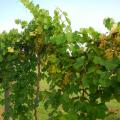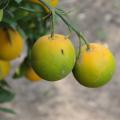What varieties of muscadines should be grown?
Muscadine varieties can be divided into several categories:
Bronze or purple fruit - the fruit produced will either be bronze or purple in color.
Fresh market or Juice varieties - Fresh market varieties have large fruit and are good for fresh consumption. Although the fruit is larger, the vine usually produces less fruit than the juice varieties. However, the pounds per vine may be similar. Juice varieties produce large amounts of smaller fruit that is ideal for the production of juice, jelly, jam, or wine. The fruit quality is often just as good as the fresh market varieties, but the fruit size is smaller.
Self fertile or female flowers - a muscadine variety will produce either female or imperfect flowers (only female flower parts) or self fertile, perfect flowers (male and female flower parts). Vines with imperfect flowers must have a vine with perfect flowers nearby in order for pollination to occur. An imperfect flowered vine will not have fruit if a pollen source is not located nearby. One perfect flowered vine can pollinate eight surrounding imperfect flowered vines. In a single row planting, every third vine should be a pollinator.
The following are some recommended muscadine varieties:
Alachua - Purple, medium size, excellent muscadine flavor, self fertile, dry stem scar, fresh fruit quality. Leesburg, Fl 1990.
Black Beauty - Purple, crunchy skin, large size, excellent flavor, female, good yields, extended harvest, excellent vigor, fresh fruit quality. Ison, 1988.
Black Fry - Purple, large, female, good vigor, medium-tough skin, excellent flavor, fresh fruit quality. Ison, 1986.
Carlos - Bronze, tough skin, medium size, good flavor, self fertile, high yields, excellent juice quality. Raliegh, N.C. 1970.
Cowart - Medium size, tough skin, purple, good flavor, self fertile, uneven ripening, long season, good juice quality. Experiment, Ga. 1968.
Darlene - Bronze, large fruit, medium-tough skin, good flavor, low vigor, female, excellent fresh fruit quality. Ison, 1988.
Dixieland - Bronze, medium large, excellent flavor, medium-tough skin, self fertile, unpredictable yields, good fresh fruit quality. Ison, 1976.
Doreen - Bronze, tough skin, medium size, good flavor, self fertile, high yields, excellent juice quality. Mississippi State University, 1981.
Fry - Bronze, medium large size, good flavor, crunchy skin, female, susceptible to disease (must spray for disease control), cold sensitive, low vigor, excellent fresh fruit quality. Experiment, Ga. 1970
Fry Seedless - Bronze, good flavor, skin moderately tough, light purple coloration, must be sprayed with gibberellic acid to achieve a marketable size. Ison, 1990.
Granny Val - Bronze, medium-tough skin, large size, late maturing, good flavor, self fertile, uniform ripening, sensitive to cold weather, good fresh fruit quality. Brooks, Ga. 1983.
Higgins - Bronze, medium size, tough skin, good flavor, female, good juice quality, Experiment, Ga. 1955.
Hunt - Purple, medium size, good flavor, medium-tough skin, female, good juice quality. Experiment, Ga. 1920.
Ison - Purple, medium large size, excellent muscadine flavor, medium-tough skin, self fertile, uniform ripening, good pollinator, good yields, good fresh fruit quality. Ison, 1986.
Janebell - Bronze, medium large fruit size, tough skin good sweet flavor, uneven ripening, self fertile, good fresh fruit quality. Ison, 1988.
Jumbo - Purple, large size, good flavor, female, good fresh fruit quality, tough skin a drawback. Experiment, Ga. 1970.
Magnolia - Bronze, tough skin, medium size, good flavor, self fertile, excellent juice quality, Raleigh, N.C. 1962.
Noble - Purple, small to medium size fruit, good flavor, tough skin, self fertile, excellent juice quality. Clayton, N.C. 1973.
Scuppernong - Bronze, tough skin, medium size, good flavor, female, good juice quality, popular because of name recognition. Wild seedling.
Sterling - Bronze, tough skin, medium large size, self fertile, excellent juice quality. Clayton, N.C. 1981.
Sugargate - Medium large size, purple, inconsistent yield, good flavor, medium-tough skin, female, good fresh fruit quality. Ison, 1974.
Summit - Bronze, medium large fruit, excellent flavor, high sugar content, medium tough skin, female, very susceptible to black rot and bee problems, good fresh fruit potential. Experiment, Ga. 1977.
Supreme - Purple, large fruit, good flavor, medium-tough skin, heavy yield, female, excellentfresh fruit quality. Ison, 1988.
Sweet Jenny - Bronze, large size, excellent flavor, crunchy skin, female, excellent fresh fruit quality. Ison, 1986.
Triumph - Bronze, medium-tough skin, medium large size, good muscadine flavor, self fertile, nonslip skin, dry scar, excellent fresh fruit quality. Griffin, Ga. 1980.
Watergate - Bronze, large size, good flavor, medium-tough skin, uneven ripening, female, excellent fresh fruit quality. Ison, 1974.
Publications
News
RAYMOND, Miss. -- This year, Julie Bounds was expecting a bumper crop of blueberries. What she could not anticipate was the excess amount of rainfall her family’s blueberry farm would receive. This untimely rain has been the biggest challenge for growers across the state.
Fruit production requires considerable effort, and some fruits require much more care than others -- facts specialists with the Mississippi State University Extension Service keep in mind as they provide research and information support to the industry.
MSU has ongoing blueberry research at the South Mississippi Branch Experiment Station in Poplarville and the Beaumont Horticultural Unit, and muscadine research at Beaumont and the McNeill Research Unit. MSU also has trials and research on blackberries, wine grapes, elderberries, passion fruit and strawberries.
RAYMOND, Miss. -- A statewide citrus quarantine was issued recently for Mississippi after one of the most serious citrus plant diseases in the world was detected in the state. Citrus greening, also known as Huanglongbing or HLB, was confirmed earlier this year, according to a press release from the U.S. Department of Agriculture’s Animal and Plant Health Inspection Service, or USDA APHIS. There is no cure for the disease, which is caused by a bacterial infection spread by the Asian citrus psyllid, a gnat-sized insect. Infected trees die within a few years.




